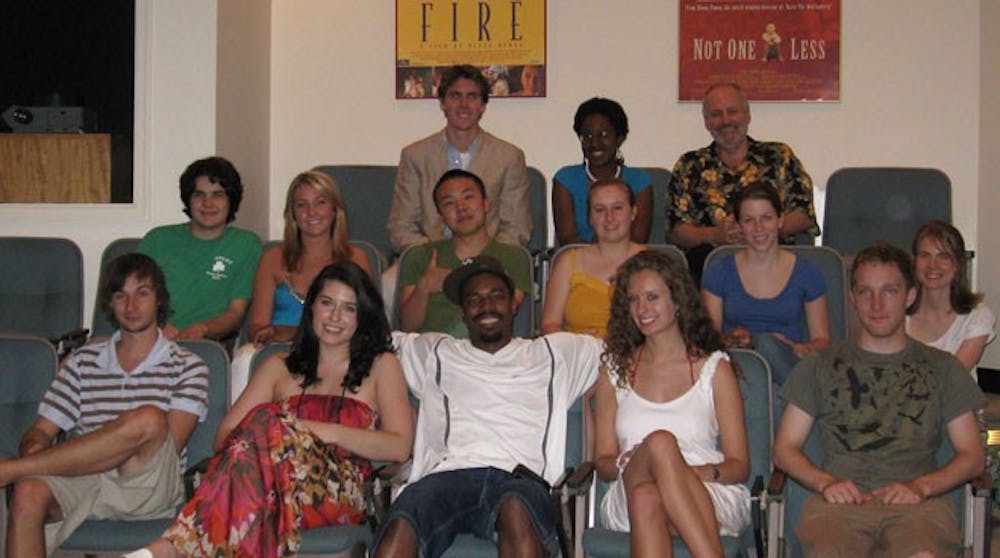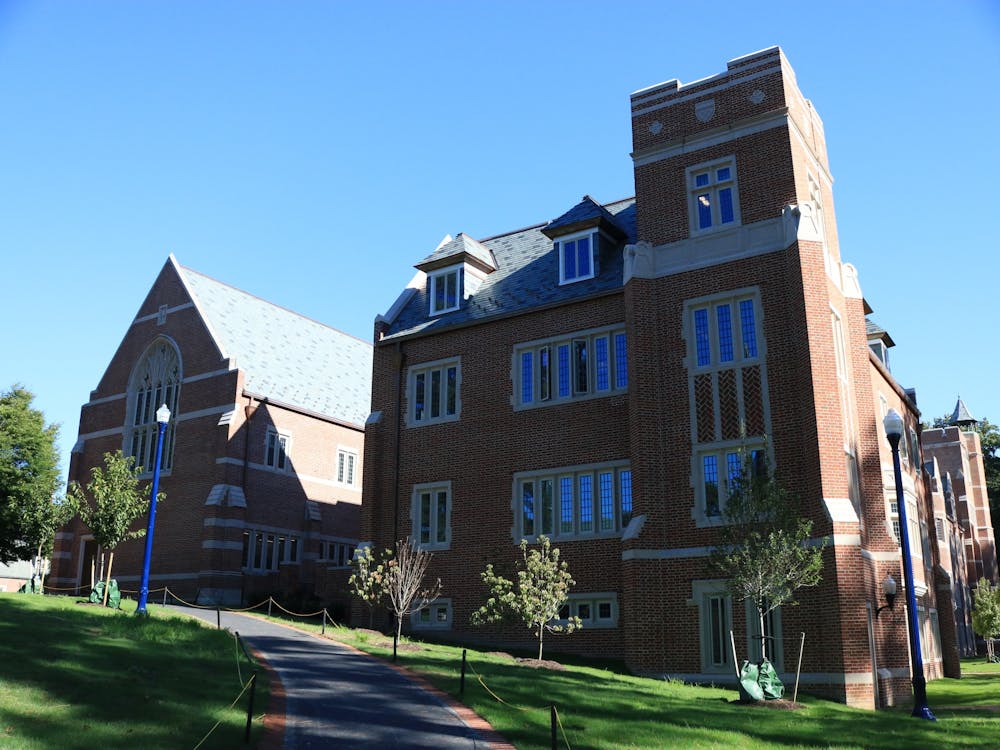Audience members who attended "UR Doc Fest" followed a poetry slam group as it prepared for nationals, explored the life of a 16-year-old aspiring singer who was homeless and traveled to Burma to visit monks and nuns on their quest to Nirvana.
The event premiered three student films at 3 p.m. Sunday to a nearly full Adams Auditorium in the Media Resource Center, and was led by Robert Hodierne, associate professor of journalism.
"I think you'll be impressed, as I was, with the level of technical achievement these films have received," Hodierne said before the screening.
Junior Ryan Breen said he thought the filmmakers took on interesting styles in how they chose to touch viewers. "It's an eye-opening experience to know how amazing some of our filmmakers already are," he said.
The first film was "SLAMrichmond," produced by 12 students in Hodierne's Documentary II class, which followed a six-week selection of the Richmond slam team that will go to West Palm Beach this August to compete in the National Poetry Slam.
Senior Maxine Naawu led the class by directing the project, which culminated in a 30-minute film. All students had to pitch a story idea at the beginning of the semester, and Naawu was appointed to her leadership position when she presented her poetry slam idea.
"Freshman year I came here and thought it would be great to make a movie," Naawu said. "It was crazy to see people laughing at certain parts, and people leaning in and seeing who would win [the team appointment]." Showing the documentary was a great way to end her senior year, she said.
Naawu, a political science major who has taken several journalism courses, said she was inspired to create the piece when she attended "Tropical Soul" slam in Richmond. Some members of the poetry slam team had participated in the event, and were willing to be featured in the documentary.
"They perform for the judges, but they slam for themselves," said the narrator of the film, Warin Henry.
Before the screening, Naawu said: "It was theatrical and dramatic, and showed their real lives. We followed the poets and their background stories."
The other team members were selected to edit, film, organize, narrate and conduct interviews, and spent every Saturday night attending the slams. "Everyone did tons and tons of work," Naawu said. "I appreciate my professor having faith in me and helping me direct."
The filmmakers were able to get close with the slam team, two of whom attended the premiere.
Enjoy what you're reading?
Signup for our newsletter
"I'd love to continue to make movies," Naawu said. The team is spending the next week editing a few mistakes they saw in the film, she said.
The second film screened was "Pebbles in the Road," which presented the story of Latifa White, a 16-year-old aspiring R&B and gospel singer. She was living at HomeAgain, a transitional housing shelter for the homeless, with her mother, who had recently battled breast cancer.
Senior Logan Turner, an interdisciplinary studies major whose work has centered on film production, made the film as part of the Documentary II class for his senior thesis project. "Pebbles in the Road" was the longest film he has made out of five others, he said.
"I was struck by how down to earth they were and how they were relaxed during the whole project," Turner said. "They are all really hard-working people."
Turner decided he wanted to make a film about homelessness after he was homeless and had to live in his car during a month he spent in Los Angeles, he said. He had been studying the film industry there the summer before his junior year, and had been living with a friend until his friend's mother said he couldn't stay with them anymore.
"Most people don't look at homelessness from the perspective of a family, or a minor," he said.
The film, which was 35-minutes long, follows White as she prepares to sing at a showcase in Henrico, Va., before influential people in the music industry. White wanted to be a singer to make money so she could get out of the situation she and her family were in, and said that she wanted to reach people with her voice.
The film told White's life story, and showed her going through practice, recordings and the coaching process with producer Lamont Fleming, who was responsible for getting entertainer Chris Brown started in the music industry.
"[The film] should help her," Turner said. "They don't really need the whole film to promote her. They mostly need the music footage I took."
Turner will be showing a shorter version at a HomeAgain black tie benefit May 12, when guests will be roasting Thomas N. Chewning, the CFO of Dominion Power, Inc. The event is to honor members who have played an influential role in combating homelessness, Turner said. Beginning in May, Turner might also be shooting a music video for Fleming.
The final film screened was a 30-minute independent study by senior Theodore Martland, called "Dhamma Dana: The Theravada Monastic Tradition in Myanmar." Hodierne was Martland's adviser for the project.
"'Dhamma Dana" takes you into the 'Golden Land' of Buddhism and shows how the Burmese Buddhists make finding this sort of freedom possible."
For five months, Martland was studying Buddhism in India, where his meditation teacher, Dr. Molini, Burmese nun, Theravada Buddhism professor and social worker, asked him to make a documentary about the monastic tradition in Burma.
She wanted to show the film to her classes and to investors of the organization she works for, called Dhamma Moli Project, which pulls girls out of the South Asian sex trade and educates them in nunneries, Martland said. He will be entering the film into as many festivals as he can, he said, and will sell DVDs to support Molini's cause.
Martland's project was for credit, and represented two semesters of independent study, which was complemented by a 30-page research paper, he said.
Molini helped Martland contact the Burmese Ministry of Religious Affairs so he could get permission from Burmese government officials to travel throughout Burma to film the documentary. He obtained a 26-day Visa, and collected 20 hours of footage.
"Theravada, which means 'ancient teachings' is the orthodox Buddhist tradition followed by 90 percent of Burmese people," Martland wrote in his blog. "Five percent of Burmese are ordained members of the Sangha, or 'community of monks and nuns.'"
Martland, a philosophy major and rhetoric and communications studies minor, said he planned on making another documentary about his time in India because he has 50 hours of footage, he said.
He brought a video camera to India to tell a story about his experiences, he said, and was filming everything he could.
Senior Chris Genualdi, who studied Buddhism in Thailand two years ago, said watching the film was nostalgic for him, and that he enjoyed Martland's theme.
"I do have one favorite moment," Martland said, "but it's a secret. It's about three seconds. I see it as the film's climax."
He didn't want to say what it was, he said, because he wanted to wait to see whether a viewer would notice it.
Collegian staff writer Nick Mider contributed reporting for this story.
Contact reporter Kimberly Leonard at kimberly.leonard@richmond.edu
Support independent student media
You can make a tax-deductible donation by clicking the button below, which takes you to our secure PayPal account. The page is set up to receive contributions in whatever amount you designate. We look forward to using the money we raise to further our mission of providing honest and accurate information to students, faculty, staff, alumni and others in the general public.
Donate Now



